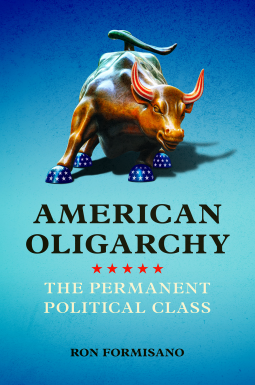
American Oligarchy
The Permanent Political Class
by Ron Formisano
This title was previously available on NetGalley and is now archived.
Send NetGalley books directly to your Kindle or Kindle app
1
To read on a Kindle or Kindle app, please add kindle@netgalley.com as an approved email address to receive files in your Amazon account. Click here for step-by-step instructions.
2
Also find your Kindle email address within your Amazon account, and enter it here.
Pub Date Sep 30 2017 | Archive Date Nov 28 2017
Description
A permanent political class has emerged on a scale unprecedented in our nation’s history. Its self-dealing, nepotism, and corruption contribute to rising inequality. Its reach extends from the governing elite throughout nongovernmental institutions. Aside from constituting an oligarchy of prestige and power, it enables the creation of an aristocracy of massive inherited wealth that is accumulating immense political power.
In a muckraking tour de force reminiscent of Lincoln Steffens, Upton Sinclair, and C. Wright Mills, American Oligarchy demonstrates the way the corrupt culture of the permanent political class extends down to the state and local level. Ron Formisano breaks down the ways this class creates economic inequality and how its own endemic corruption infects our entire society. Formisano delves into the work of not just politicians but lobbyists, consultants, appointed bureaucrats, pollsters, celebrity journalists, behind-the-scenes billionaires, and others. Their shameless pursuit of wealth and self-aggrandizement, often at taxpayer expense, rewards channeling the flow of income and wealth to elites. That inequality in turn has choked off social mobility and made a joke of meritocracy. As Formisano shows, these forces respond to the oligarchy’s power and compete to bask in the presence of the .01 percent. They also exacerbate the dangerous instability of an American democracy divided between extreme wealth and extreme poverty.
Ron Formisano is the William T. Bryan Chair of American History and professor emeritus of history at the University of Kentucky. His books include Plutocracy in America: How Increasing Inequality Destroys the Middle Class and Exploits the Poor, The Tea Party: A Brief History, and For the People: American Populist Movements from the Revolution to the 1850s.
Advance Praise
“A desperately needed contribution to political education for those citizens and political pundits seeking to gain a better understanding of the impact of the latest massive shift in economic and political power and struggling to overcome the antidemocratic consequences of the concentration of wealth and power in the hands of so few. In combining sure theoretical and conceptual political and historical analysis with example after example and case study after case study of rising plutocrats and their political minions reshaping our body politic, Formisano strips away the myths and illusions of mainstream apologists of our present state and illuminates the changing face of political-economic power in America that no previous work has managed so far to achieve. While not for the faint of heart, it speaks loudly and boldly to those progressive forces searching for avenues of renewal for our current political plight.”--Ernest J. Yanarella, author of North American Auto Unions in Crisis: Lean Production as Contested Terrain
Available Editions
| EDITION | Paperback |
| ISBN | 9780252082825 |
| PRICE | $19.95 (USD) |
| PAGES | 312 |
Links
Featured Reviews
 David W, Media/Journalist
David W, Media/Journalist
Tales from the swamp
We all know it, but the details are still stomach-churning. American Oligarchy relates how the Ruling Class operates. It is focused mainly on government, where electeds vote themselves perks like free cars, multiple no-obligation airline reservations (first class), and free global junkets for friends and family on 16 planes maintained by the Air Force for their private use. It allows them to hire friends and family on taxpayer money, and earmark cash grants for favored businesses. They spend half their time raising money for their next election, and the rest accepting gifts, dinners and more junkets from lobbyists, while steadfastly maintaining it has no effect on their positions. They live high off the perks, high off the PAC money, high off the lobbies, and eventually become millionaires themselves (Half of them are at any given time). The system is way out of whack.
Formisano says the United States is headed beyond oligarchy to an aristocracy of inherited wealth, as the ruling class joins the business aristocracy in stashing wealth for its progeny. Nepotism is plainly visible right on television, as networks compete to hire the children of the ruling class right out of school.
Our so-called market economy is becoming a market society, where the wealthy can cut in line. A classic example is paying for a high-occupancy-vehicle “permit” even though you always drive alone. America is corrupt, through and through. Americans look at the bribery that goes on elsewhere and shudder. But it is the way of life in American government, and everyone on all sides is there to get rich first and above all. The middle class and the poor only count on election day when they all suddenly become populists.
As Formisano points out, this sort of rot is absolutely typical of a country in its late stages. It is a sign of the end.
It doesn’t have to be this way. In France, the very first thing newly-elected President Emmanuel Macron did was introduce a law banning the hiring of family by electeds, banning earmark slush funds, banning the holding of more than one elected post, and imposing term limits. In the USA, the first thing the new Congress did after the election of Donald Trump was to close down the Ethics Office.
There is a special chapter on Kentucky and its particular flavor of corruption, theft and high living by civil servants and executives among the legions of poor. Formisano is in Kentucky, so this whipping child of a state is personally known to him. It is revolting how NGOs and civil servants constantly seek to monetize their positions out of taxpayer dollars, and it is rampant. And don’t think for a moment this is unique to Kentucky. In The Poverty Industry, Daniel Hatcher points out that New Hampshire fairly brags that 40% of the state budget is taken from Medicaid funds meant for the poor. How much more institutionalized can corruption be?
Formisano’s pace is fast and steady. He is unrelenting. You get the impression he could just as easily have made the book 900 pages. It is very readable, very accessible, and strangely numbing. After a while, you begin thinking this is ingrained, a structural feature of the republic. I think he noticed this, because there is an Afterword where he points to how we have gotten past nodes like this before. From his pen to God’s ear.
David Wineberg
This review isn't going quite to fit the pattern of a regular review as I took over six weeks reading this book and heading down several rabbit trails as I attempted to figure out what I thought about this topic. First off, Ron Formisano should get together with Elizabeth Warren as I believe they agree on the state of our nation and how it got to this place where the middle class is now like the poor of years past.
This book is for you if you want an in-depth, detailed look at the U.S. government and the people we have elected and how their families benefit from their connections. We all know on some level that there are benefits to being rich and holding office. It's also widely believed that you can't get elected these days unless you are wealthy due to the high cost of advertising and traveling the campaign trail.
When I got to about the halfway mark reading this book I put it down and did some research on my own. Political scientists Martin Gilens, of Princeton, and Benjamin Page, of Northwestern, studied this very topic in 2014.
They wrote: "Americans do enjoy many features central to democratic governance, such as regular elections, freedom of speech and association, and a widespread (if still contested) franchise. But we believe that if policymaking is dominated by powerful business organizations and a small number of affluent Americans, then America’s claims to being a democratic society are seriously threatened."
Huh. So I went back to this book and read the rest. As I read, I found myself nodding in agreement and feeling more and more cynical about the state of the union. Lobbying Firms, Thinktanks, Big Pharma, and the media are all staffed by nepotism of the oligarchy class. It's kind of like not asking how to make sausage because once you find out, you go through that uncomfortable period of being super aware and uncomfortable. Now, most of us eventually tuck that info away and just don't dwell on it. I don't think we have that luxury anymore.
I found this to be one of the most well researched and footnoted books on the subject that I've ever read. I'll end with this sentence from the author,
"American Oligarchy has been written, not to propose a path out of the New Gilded Age, but to discredit the political class by raking its muck between covers in black and white."
I read this book as a DRC in exchange for an honest review.
 Debbie H, Reviewer
Debbie H, Reviewer
I think this book was well written on the subject of a "permanent" political class. Families and generations have participated in politics. We have seen nepotism; corruption at local, state, and federal levels; rule bending and breaking by lobbyists/consultants; journalists; non-profits; and the list just goes on. And how our state and federal tax dollars are misused, let alone, thinking about the miss-use of my $$$ that have gone to a "charity". Take a good read about Goodwill. Just wait till you read how these actions are accomplished!!
For me...this book was not a fast read, but I needed to take some time to think about several chapters before I went on in the book. Personally, it makes me wonder how we get this country out of this kind of behavior. Appears this book was well researched and it was enlightening.
 Jeremy R, Reviewer
Jeremy R, Reviewer
This is an interesting book about how those with power and money have in essence transformed the government into an oligarchy designed to self-perpetuate the elites. The author discusses self-dealing, and corruption, among politicians and how money and the quest to raise more money to help ensure re-election influences the decisions made and legislation passed by politicians. He discusses the revolving door between Congress and K Street (the lobbyists) and how retired (or defeated) members of Congress and Congressional staff get around laws and rules designed to prevent members of Congress immediately becoming lobbyists after leaving Congress.
The author covers a broad range of topics, which are all interconnected. He discusses the exorbitant salaries received by leaders and other staff of non-profits, in particular charities, money that should be spent advancing the mission of the non-profit. He explains how the boards of corporations and non-profits either openly enable or ignore inappropriate behavior by leadership because they financially benefit. "The political class embraces many other subgroups such as highly compensated university presidents and academic administrators, and the executives of well-funded nonprofit institutions (e.g., hospitals, museums, other cultural institutions." Some of the information will be familiar to anyone who follows politics and some of the general behavior will not be particularly surprising, but the extent of the self-dealing and inappropriate behavior may be surprising. In reading the e-book, I was often taking screenshots of pages because the information was so interesting or outrageous that I wanted to have it to refer to later, including when preparing this review. One of the strengths of the book is the numerous specific examples; in fact, about a quarter of the book consists of the citations that support his numerous examples. For example, in 2011, the head of the American Cancer Society was paid $2.1 million and the head of the Boys and Girls Clubs of America was paid $1.8 million. Think about how much good that money could have done if used to support the non-profits, not enrich the leadership.
There are times were the author's liberal bias is quite evident, but overall he does a good job of highlighting hypocrisy, self-dealing, and inappropriate behavior by both liberals/Democrats and conservatives/Republicans, reserving some of his harshest criticism at times for specific individuals who identify as liberal/Democrat (for example, Tom Daschle and his post-Congress lobbying). The author also notes that in the Obama Administration, the Attorney General (Holder) and deputy attorney general (Breuer) were "corporate lawyers whose expertise was defending the misconduct of financial firms and corporations." Surprise, surprise, the DOJ under Holder and Breuer refused to prosecute individuals from the financial firms that helped cause the "Great Recession."
The only real weakness in the book is his discussion of the Supreme Court, especially as he claims that "The current Supreme Court is the first in U.S. history on which sits not one person who had practical political experience." Justice Thomas was an assistant attorney general in Missouri, legislative assistant to Senator Danforth, Assistant Secretary for Civil Rights at the Department of Education, and the Chairman of the Equal Employment Opportunity Commission (EEOC) for eight years before being appointed to the federal courts.
Overall, this book is well worth reading.
 Willy M, Reviewer
Willy M, Reviewer
Ron Formisano in his book "American Oligarchy" gives both a political primer on how politicians make money and a very cogent argument as to why Populists of all varieties not just Trump are now finding a receptive audience with voters. Looking in depth at the current practices of US politicians this well researched book details minutely the way the system works and gives example after example of sleaze and mismanagement.
Although the book does mention alternatives and in someway in the conclusion and afterword grounds his research in the larger historical and global context, it is however a narrow view of what the state of political corruption is now. To be precise it's a highly focused beam of light on what the shenanigans and double dealings are which make up the political class that Americans everywhere are so disgusted with. A more relevant book for the problems of the day I can't think of, although one does wish perhaps for a more broad coherent strategy for how American can get out of this mess.
 Rick M, Reviewer
Rick M, Reviewer
Excellent look at how America became an oligarchy and how this effects every person in the country. This book is easier to understand than most I have read on the subject. I recommend this book to anyone with even a passing interest in American politics.
This was interesting to read given our current political climate. It took me a while to read it as well since it gets deep and dense in places. Very glad to have read it.
 Nancy W, Reviewer
Nancy W, Reviewer
This is an interesting look at the permanent political class that has developed in Washington DC right under our nose. It starts with a little doing something to help and then could the politician do something small in return. It is too easy and then they are hooked. Probably only the tip of the iceberg. Very interesting though.
 Reviewer 88337
Reviewer 88337
Without a doubt this is one of the most informative if depressing books I've read on the state of the United States in recent history. There's no surprise in the fact that corruption exists throughout every level of our society, starting from senators in Washington to our local representative and officials. Nonetheless, the level of nepotism evident throughout our government defies imagination; from giving cushy jobs to family members and friends, to directing earmarks for local and state businesses who in turn donate to local and national campaigns in order to keep the gravy train going.
A real surprise was seeing that this blurred line between legal and illegal activities (forget ethics) has penetrated our supreme court (which today contains no one that has done public service, unlike previous justices, thus in part leading to the Citizens United ruling), not for profit charities and hospitals that have enriched their CEOs, the mass media (which partly explains why we keep seeing familiar surnames with little in the way of brains or talent who could never do justice to issues that the majority of Americans are facing day to day thanks to their privileged upbringing), the pharma industry that with lies and deception has saddled the United States with an opiates crisis taking tens of thousands of lives a year, and for-profit colleges that have taken advantage of tens of thousands of Americans by distorting information about job placement rates while readily forcing students to take on ridiculous levels of debt. These seemingly unrelated institutions are brought together by the connections they create when seeking government protection, aid, loans, or by simply giving donations (it's frankly embarrassing how little it takes to buy favors from our government officials).
In part this book treats Democrats and Republicans similarly, especially when it comes to the revolving door of the Senate and House with 'K street.' Lobbyists and Think Tanks (conservative Think Tanks seemingly overwhelm their progressive counterparts) create platforms, positions, proposals, and justify actions and activities undertaken by our representatives and government officials. Those who decide to leave their government positions, for one reason or another (taking their hefty pensions with them), readily joined lobbying firms and take in hundreds of thousands of dollars a year as they helped shape future decisions and policies. In fact, promises of such high paying jobs mean they are in debt to lobbyists even before they leave their government positions; no reason to rock the boat and actually serve as a representative of your constituents if it's going to cost you a cushy job in the future.
Suffice it to say that this is a must read, if only to make it clear that the system that is supposedly serving us is continually subverted and perverted by special interest groups. Those with means and money continually alter the playing field as they reinforce old and create new obstacles for those hoping to escape poverty and deprivation. That we are continuously presented with criminal cases against large corporations and government officials means this is something that happens daily. There is no ready answer for the multitude of problems we face as a nation, but knowing they exist is at least a start to thinking about how we can identify and overcome them.
 N J, Reviewer
N J, Reviewer
This book was both depressing and captivating in its accuracy of the state of the American economy, society and political elite. One only needs to not be part of the one percent to see how much privilege wealth provides in life, regardless of other factors like race and ethnicity. Formisano does a fantastic job of outlining the problems, their origins and what, if anything can be done.
What should be a difficult read is so compelling that it reads easily, eliciting the same verbal responses as a thriller or murder mystery would. This is a book that will get archived on my kindle for another read.
 Ryan M, Reviewer
Ryan M, Reviewer
American Oligarchy is a well researched indictment of the "permanent political class" as the author describes it. This permanent political class is entrenched in Congress but also in the heads of academia, local government agencies along with for-profit and non-profit organizations.
I think that most of us that pay any attention to the news know about some of the information laid out in the book. It is behind the statistic that Congress only has an approval rating of 12%. The author wants us to look past the generalities and get a better understanding of how the wealthy and powerful have set everything up to keep themselves in power along with the rampant nepotism.
This was a frustrating book to read because it gets your blood boiling, no matter where you stand politically--the point is that everybody is doing it and the author would like to get the word out about exactly what they are doing. You can practically read the author's frustration dripping off the page although I did appreciate the dry sense of humor sprinkled in throughout the book. I was left with some disappointment that there wasn't a more detailed "what can we do about this" section but there is a short afterword that gives some guidance. I think the author's goal was to shine a spotlight on the activities happening right under our nose. If that was truly the goal, Mr. Formisano was successful. Hopefully, this book will get a large audience.
A brilliantly written, scathing insight into America's ruling class - politicians. The book Americans need right now, one that could open the eyes to many who blindly believe that politicians even at the lowest levels have anyone's interests but their own at heart. Corruption permeates the system, and only a total overhaul can fix it.
 Reviewer 331638
Reviewer 331638
In his insightful book Classical Greek Oligarchy, A Political History, Matthew Simonton challenges scholarly orthodoxy, by showing that oligarchy was not the default mode of politics from time immemorial, but instead, it emerged alongside, and in reaction to, democracy.
Simonton argues that for the ruling class to stay in power, it has to remain united. The ruling elites rely on cultural homogeneity and common values to maintain close personal relationships and therefore to stay united. But being united isn’t enough. In order for the ruling class to remain in power, the people must also be divided so that they cannot overthrow them. Simonton explains the practices that oligarchs in ancient Greece used to control the people, by systematically favouring the few and, more particularly, the extremely rich citizens, and by rewarding with lucrative positions friends and collaborators. In the meantime, the ordinary people were kept dependent on individual oligarchs for their economic survival.
In Ron Formisano’s book, American Oligarchy, The Permanent Political Class, the reader can sense that many of the practises used today by the American ruling class are similar with those used by the ancient Greek Oligarchs more than two thousand years ago. Americans do enjoy many features central to democratic governance, such as regular elections. But policy – making is dominated by powerful economic elites and organised groups, a permanent political class that represents business interests and have a substantial impact on US policy.
“It is not hyperbole”, writes Ron Formisano, “to say that we have a government of the rich, by the rich and for the rich, but it is too simple. ”By plutocracy,” Formisano means “a hydra-headed and diverse collection of elites who exert enormous influence to the exclusion of the great mass of citizens: those elites include super rich families, CEOs of corporations, heads of big banks and other financial institutions, particularly hedge fund managers, and Washington lobbyists,” to name a few. They are the beneficiaries and enablers of a concentration of wealth and they are characterized by tribal insularity, personal irresponsibility, lack of concern for the wants and views of others, cynicism, shameless materialism, and short-term thinking.
The United States is headed beyond oligarchy to an aristocracy of inherited wealth, argues Formisano. The preferences of the average American appear to have only a minuscule impact upon public policy. The result is a continuing discontent and disgust with the permanent political class, along with a corrosive alienation from government.
Formisano treats Democrats and Republicans similarly, especially when it comes to the connection between politicians, lobbyists and Think Tanks, the “revolving door of Congress to K Street,” as it is known. He exposes the private student loan industry, the rampant corruption in various NGOs that have enriched their CEOs, and the pharma industry which, by turning a blind eye to corruption and bribery, led to a generation of addicts, and an opiates crisis that takes tens of thousands of lives every year. Just recently, scientists at the Washington Department of Fish and Wildlife, discovered that oxycodone (a semi-synthetic opioid) is now present in mussels of the coast of Seattle. There is also a whole chapter about corruption and theft on Kentucky. Ron Formisano is a Professor of American History and he has been teaching at the University of Kentucky since 2001.
This is one of the most captivating and informative, if depressing, books that I have read about the inner-working of present day politics in the United States. Formisano provides ample evidence that the behavior of the political class, and the examples it sets, have created the current intense wave of cynicism, distrust and alienation of ordinary citizens across the political spectrum. “The ‘Populist Tsunami’ of 2016 exposed how vulnerable the permanent political class has become,” and if this proved anything, it is that Americans yearn for fairness in the distribution of social goods, for fairness in the legal system, for social justice, for a government that serves the people. The question is: is the American political class ready for this kind of change that will set out bold reforms to invigorate democracy?
 Reviewer 422211
Reviewer 422211
Nothing but the truth. Probably preaching to the choir.
Recommended for poli-sci geeks, and socialists.
 Michele M, Reviewer
Michele M, Reviewer
The writer takes a look at the political class and how they are currently entrenched in American politics. He looks at both Democrats and Republicans and how individuals from both parties make up the political class that comes from a background of wealth and privilege. He even takes a look at nonprofits and how those who head nonprofits can live as a member of the top 1 percent. This book takes a good hard look at the political system in America today.


















